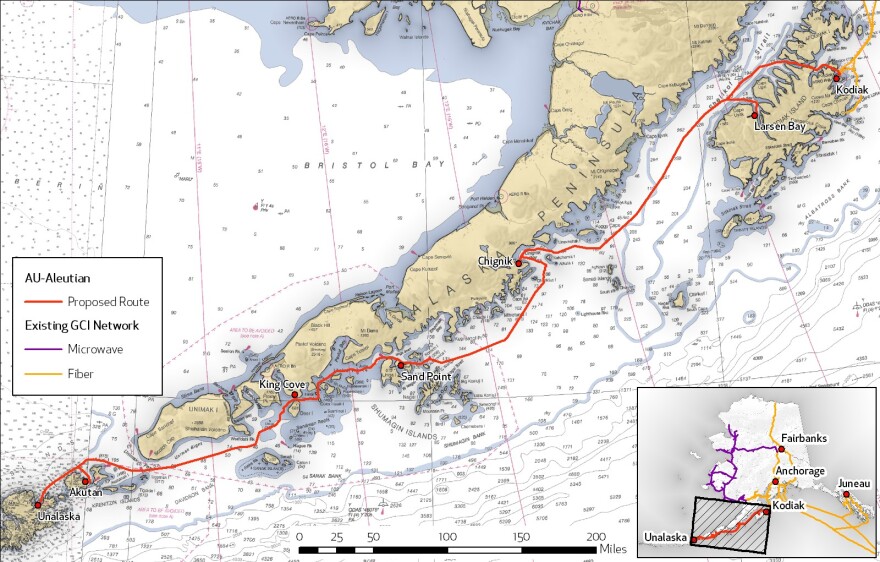GCI says it won't move forward with bringing broadband communications to Unalaska at this time unless they receive a large grant from the USDA.
The company has put in an application for a $25 million grant from the U.S. Department of Agriculture's Rural Utilities Service (RUS) to bring fiber optic broadband connection to communities along the Aleutian Island chain, where connectivity and bandwidth can often be unreliable or difficult to come by.
The proposed project would bring undersea fiber optic cable from Kodiak to Unalaska, stopping in six communities, and spanning approximately 860 miles.
"Our general plan is to bring an undersea fiber optic cable out to Unalaska that would hook into our existing undersea fiber optic infrastructure in Kodiak," said Dan Boyette, vice president of GCI. "We then would circle through Whale Pass on the north end of Kodiak Island and go into Larsen Bay, and then from Larsen Bay to Chignik Bay, and then on down the chain making stops in Sand Point, King Cove, Akutan, and then finally Unalaska."
The company plans to install some branching units to extend service to other places along the way like False Pass and Perryville – which aren't in the initial project scope, but have potential for fiber optic in the future.
Boyette said GCI has been working on the proposed project for a number of years, and the overall cost is high, coming in at $60 million. He said this high cost makes the business case difficult for them to follow through on, as they are a private corporation, which has a responsibility to its shareholders.
"In order to get the return on the investment down to what's appropriate for a company like ours, the [USDA's ReConnect Loan and Grant Program] really fit quite well," said Boyette. "So we applied for a grant of $25 million from that. And that takes the payback, or the return on investment, down to a period of years that's acceptable to us and our parent corporation."
He said he expects to hear if they've received the $25 million award from the RUS sometime between June and September. There are seven applicants in total from Alaska competing for a pot of $200 million.
If they receive the grant, GCI plans to pay for the remainder of the project – $35 million – with it's own capital.
"But if we don't get the grant award, we won't move forward at this time," said Boyette. "That's not to say that we won't apply again in round three. I know that there will be future rounds because the federal government is very determined to use this program to get broadband throughout rural America, just like they did in the 1920s and '30s, when they used the same program – the Rural Utilities Service – to get electrification throughout rural America."
Boyette said the company is in the final stages of the permitting process with the U.S. Army Corps of Engineers. And in anticipation of receiving the grant award, they are already assembling a project team, working with an undersea engineer, and working to get the permitting process in Unalaska underway as soon as possible.
If all goes according to plan, Boyette said he anticipates the company will begin the project "in earnest" in January of 2021, and will be able to initiate service in Aleutian communities towards the end of 2022. It will be roughly a two-year process.
Boyette said the company has been working its way through rural Alaska trying to build better communications facilities, and that it's really time for communities throughout the Aleutian chain to get better connectivity.
"The Aleutian chain is the last part of Alaska that does not have terrestrial broadband service," he said. "And in today's world, remaining on satellite service tends to hold back the business community. By bringing fiber optic terrestrial-style broadband, all those barriers go away. So I think that the ability for Unalaska's economy – as well as the economies of King Cove, Sand Point, and so on – to grow and help those communities become more thriving places, I think is a very real thing. We believe it's going to be transformational."
Improved internet services and fiber optic has long been a federal and state lobbying priority for the City of Unalaska, as more and more operational programs are internet-based, posing a challenge to the city as well as local organizations and businesses.
And while many Unalaskans look forward to a broadband fiber optic connection, local internet provider, OptimERA, could be in trouble. But CEO Emmett Fitch, who says the company has looked at bringing fiber optic, as well as a microwave link, to the community in the past, said he's optimistic.
"If GCI is successful in their application, and are able to get the service in place, then hopefully we can buy capacity from them and continue to do what we're doing," said Fitch. "You can't compete with satellite versus fiber, for the most part. If the fiber lands, whoever controls that fiber is going to pretty much own all of the communications, or has the ability to."
Fitch said that GCI has communicated in the past that they want to work with other providers in the area. If GCI is successful in bringing fiber optic service to the Aleutians, he said the two companies will hopefully find a way to collaborate so that OptimERA will be able to continue providing service to Unalaska.






